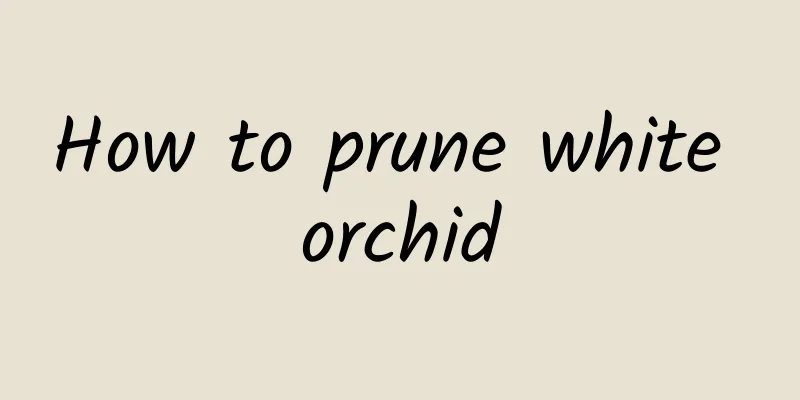How to prune white orchid

When to prune white orchidsWhite jasmine can be pruned in April and May and in September after flowering. In April and May, all poorly growing leaves on the plant can be pruned off, and the overly dense branches and leaves can be thinned out. In September, all old branches with dead flowers and leaves can be pruned off. How to prune the branches of white orchidWhen the plant has poorly growing branches and leaves, it needs to be pruned. The pruning tools need to be disinfected, and the sick, old, overlapping, crossed, rotten and unsightly branches need to be pruned away. After the flowering period is over, the dead flowers and non-flowering buds need to be pruned away. Generally, according to the law of survival of the fittest, it is necessary to cut off those diseased branches, insect-infested branches, and bent and entangled branches from the base. This can not only reduce nutrient consumption, but also encourage the plant to sprout new branches and make the new branches grow stronger. White orchid pruning grows fastThe side branches of white jasmine or the twigs on the side branches can be pulled to change the direction of the branches and promote the formation of new branches and flower buds. During its vigorous growth period, the straight side branches can be bent toward areas with larger space until cracks appear. Repeat this process after a week. You can also pinch the branches. After the flowers wither, you need to trim the remaining flowers in time. White orchid pruning flowerPotted white jasmine should have dead and old branches, diseased and insect-infested branches, long and dense branches pruned, and the old leaves at the bottom of the branches should be removed appropriately to reduce nutrient consumption and promote the growth of new branches. Tips for pruning white orchidsAfter pruning, the white jasmine must not be placed directly in the sun, but in a well-ventilated, cool place, and the temperature should be kept at 20-25 degrees. This will allow its side branches to grow faster. Do not spray water on the cut frequently after pruning, otherwise it will easily lead to slower wound healing. |
<<: How to prune glass begonia
>>: Are rose pots suitable for deep or shallow pots?
Recommend
Can a leaf of green radish survive? Can it be propagated by roots in water culture?
1. Can a green radish survive with only one leaf?...
How to grow cloud bamboo
1. Maintenance conditions 1. Flower soil: It is v...
Can passion fruit trees be potted?
Can passion fruit trees be potted? Passion fruit ...
Planting method and time of seaweed head: when is the best time to plant
Planting time of seaweed Nori is a common vegetab...
How to grow Cineraria
1. Breeding environment 1. Soil: Loose, organic-r...
What to do if Amaryllis only grows leaves but does not bloom
1. Not enough years Reason: Amaryllis can be cult...
Cultivation methods and precautions of Four Seasons Red Camellia
The four-season red camellia is a relatively easy...
Temperature and humidity for growing orchids indoors
1. Temperature Generally speaking, the best growt...
Bougainvillea takes root after soaking in water for a few days, water cutting method illustrated
1. How many days does it take to take root? It ta...
How to prune small-leaved elm bonsai
Pruning time for small-leaved elm bonsai The smal...
How to care for potted lucky seeds?
Potted lucky seeds, as an indoor green plant that...
Can the lucky bamboo be watered with beer?
1. Can be poured The lucky bamboo can be watered ...
How to grow purslane trees so they bloom
Purslane tree blossoms The flowering period of th...
Things to note when repotting the Tower of Ash
Repotting time for the Tower of Ash The seedlings...
Treatment methods for root rot of pennywort
1. Rescue Due to excessive watering and improper ...









